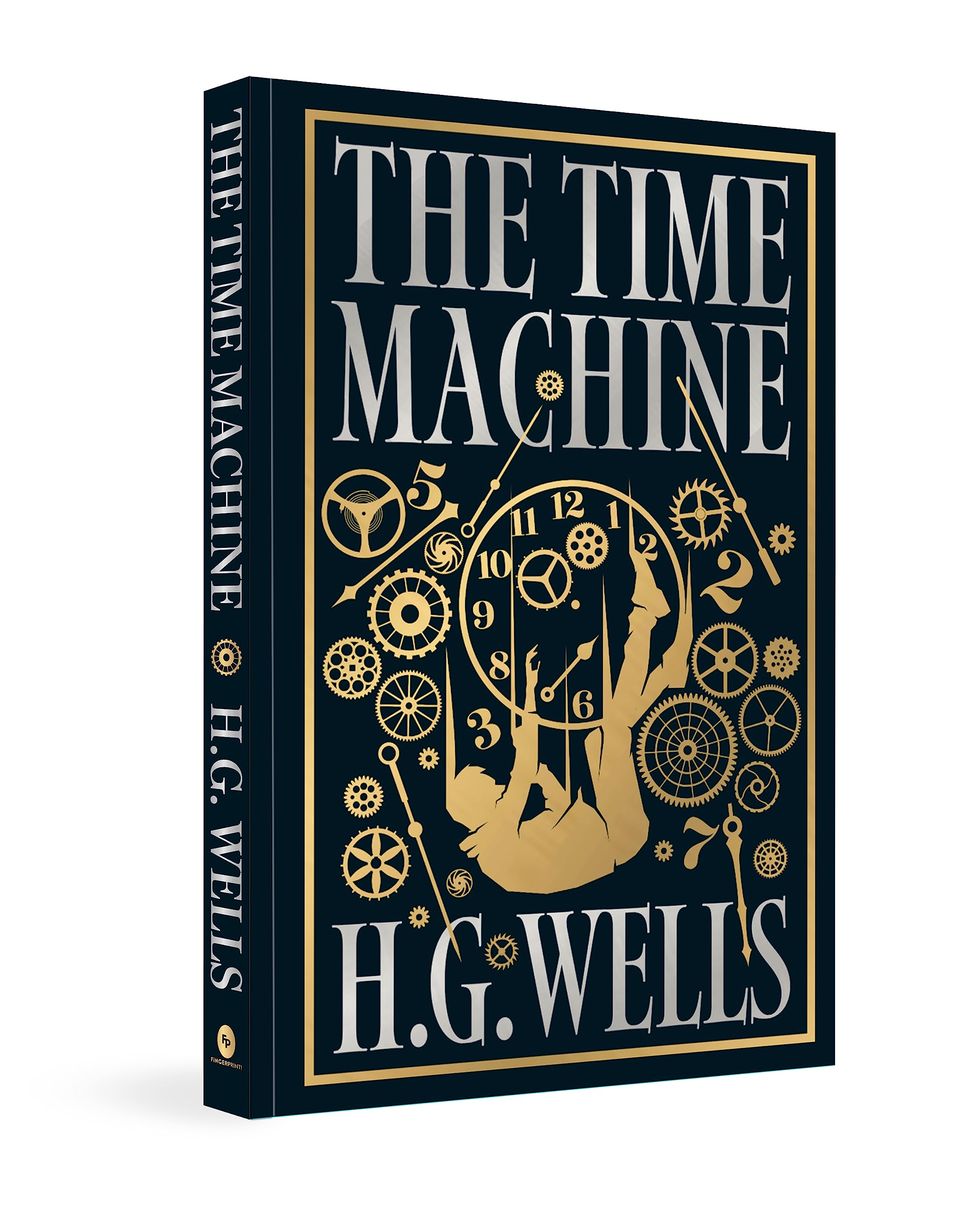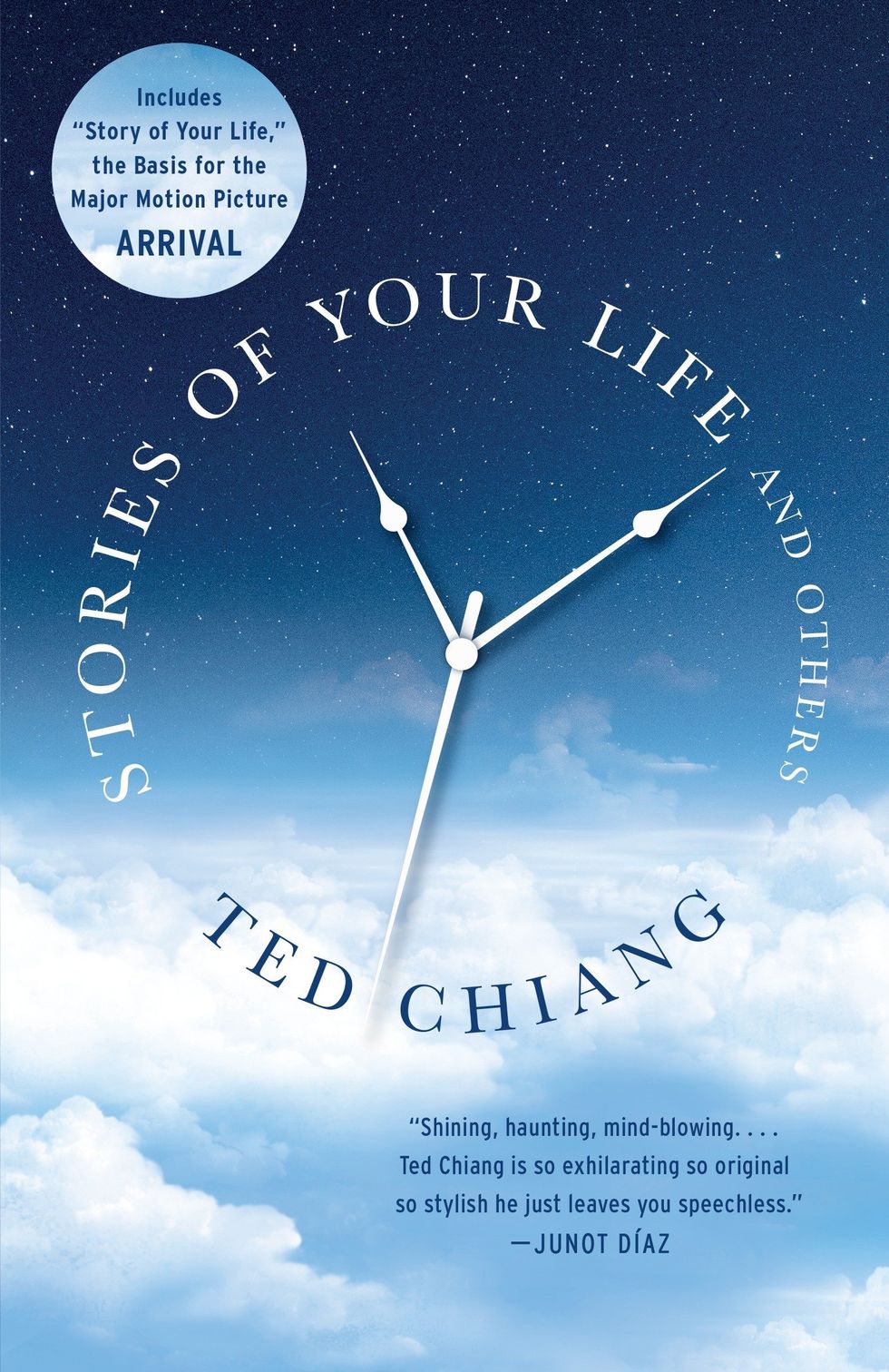Travel
Why We Love Time Travel Stories

Near the beginning of Kaliane Bradley’s The Ministry of Time, a charmingly clever time travel romance, the unnamed narrator articulates the standard take on such stories: “Anyone who has ever watched a film with time-travel, or read a book with time-travel, or dissociated on a delayed public transport vehicle considering the concept of time-travel, will know that the moment you start to think about the physics of it, you are in a crock of shit.”
The organization that gives the novel its title tests the effects of time travel by extracting people from “historical warzones, natural disasters, and epidemics” who “would have died in their own timelines anyway.” The narrator acts as a “bridge” for the “expats” of history, aiding their acclimation. About the mental conundrums that invariably arise, she assures us: “Don’t worry about it.” Logic, after all, goes out the window in stories about, as Mark Twain called it, “the transposition of epochs—and bodies.” Time travel, in other words, is too intellectually challenging for our limited brains.
Time travel stories repeatedly tell us this. “The technology’s all in the folders in front of you,” the President’s Chief of Staff tells a table of senators in Timecop. “You won’t understand it any better than I can.” In terms of narrative efficiency, this is an understandable approach to what would ultimately amount to superfluous exposition. For whatever reason, time travel is the fictional technology movies and novels spend the most time justifying, which leads to shit like this: in the comic The Man Who F*%@ed Up Time, an inventor explains the final ingredient that made his machine work: “that neutrino manifold to stabilize the oscillation frequency of the tachyon harmonics.” Oh, of course! Why hadn’t I thought of that?
Nowadays, we are all now conscious of and even comfortable with the paradoxes and illogic that stem from time travel. We can casually cite the Grandfather and Bootstrap paradoxes; we know that matter can’t be in two places at once and that any changes made to the past will have disproportionate (butterfly) effects on the present. As a culture, we’ve grown savvy to (and thus bored of) the perfunctory use of thorny abstractions to legitimize plot points, which is why Bradley’s preemptive dismissal quoted above has become the more common move in contemporary time travel stories.
For writers, though, time travel is a clusterfuck of narrative assembly: as Dean Craig Pelton weepily laments in an episode of Community, it’s “really hard to write about.”
Ironically, the device of having characters journey to the past or future resolves more complexities than it pretends to create. Our human longings to make different choices or live beyond the capacities of our bodies, not to mention the endless array of unanswerable questions that comprise our imaginations—it is the impossibility of such yearnings and such inquiries that make us us. In time travel stories, these are made manifest, the questions answerable, our longings requited. And in doing so, the allure of mystery is replaced by the banality of fact.
Reading The Ministry of Time, it’s difficult not to contemplate the more recent tropes of the genre it playfully skewers, but also neatly encapsulates—temporal bureaucracy, fish-out-of-water anachronism, an elaborate vocabulary of techno-jargon—and wonder how the conventions have changed over time. Moreover, Bradley’s novel reminds us how time travel stories fail to address the many ways time itself—our understanding of it, cultural paradigms about it, its use by powerful entities—determines so much about our lives, our history, and the very foundations of our society. The conceit that time travel is so complicated as to require explicatory condescension from authors belies the truly complex issues revolving around time, sans any fantastical feats. Not only will the great problems at the heart of existence not be fixed by time travel, but such stories rarely even take on those problems, nor the very real dangers and surprisingly wide influence of the construct whose rules they’re ostensibly violating.
So let’s put the two up against each other—time travel versus time—to show that the former is a kind of Devil’s advocacy, while the latter is multi-pronged, with numerous iterations and contradictory attributes. But if we can rethink our reflexive grasp of time, in this life, now, it can do more for us than a novel’s thought experiment—hell, it could do more for us than if time travel actually existed.
The plots of time-travel stories, rather than the theoretical concept of moving through time, are what truly bewilder us—with their doubling and tripling of characters, their narrative contradictions, their constant juggle of story and twist. Watching a brilliantly constructed show like Dark challenges our ability to retain complex developments—characters depicted at various ages, in numerous periods, as well as their parents and children who, by a miracle of casting, look remarkably similar to the actors playing their kin, making the show feel more realistic, but also more confounding.
Confusing us with convoluted plots, though, is different from doing so with the theories from which they derive. In practical reality, the quagmires of time travel run their course rather quickly. Storytellers, on the other hand, push beyond the nonsensical repercussions in search of a way to explain away, incorporate, or ignore the inevitable contradictions and dramatic dead ends. Their dedication to the intricacies of plot can be impressive, to be sure, but it’s nothing more than an elaborate construction festooned with quantum accoutrement. The claims of physics disabuse us of explanations based on our common sense, but leave nothing to replace them other than a series of vague terms like “branes” and “strings” and “foam” and “blurring.” Physics—like all sciences—aims to discover the laws that govern the universe, but in the eyes of ordinary people, it seems merely to disprove ideas to which we’ve only just grown accustomed. The scientific method operates on the premise that our search is never over, that our assumptions don’t necessarily hold, and that new and better ideas are always on the horizon. Existence in all its naked glory has yet to be completely understood.
Stories, conversely, seek fundamental truths in the messy, incomplete pile of the ways things are. They rummage through what’s there—regardless of its value—and sift out something resembling meaning and purpose. Time travel, then, provides writers with additional mounds of life to contrast with the one belonging to the character’s own period. In Mark Twain’s early take on the genre, A Connecticut Yankee in King Arthur’s Court, a man from the 1880s tries to introduce his era’s ethos to medieval England. In H.G. Wells’ seminal The Time Machine, it’s the economically segregated future that brings relief to the societal ills of the traveler’s present. The Ministry of Time jettisons a Victorian sea commander into near future England, and what’s wonderful about Bradley’s approach is the leisure it allows itself in tracing the commander’s acclimation to his new temporal circumstances. Bradley has a lot of fun with this setup, giving Commander Gore some hilarious moments, as in the chapter where he returns to his “bridge” (his future-time handler) and asks her, “Some charming young women—out on the heath—addressed me quite boisterously—what is a ‘dilf’?”
Such fish-out-of-water antics are the bread and butter of time travel narratives, certainly, but they’re also the meeting point of science and literature: the circumstances are brought about by scientific ideas, but examined by literary principles. In the years after Wells published The Time Machine, James Gleick writes in his indispensable Time Travel: A History, philosophers scrutinized his concept, despite the fact that Wells “never meant to promulgate a new theory of physics” and would later disappoint admirers with his curt dismissal of time travel’s viability. Gleick quotes Wells from the late 1930s: “The reader got a fine confused sense of immense and different things. The effect of reality is easily produced. One jerks in one or two little unexpected gadgets or so, and the trick is done. It is a trick.”
For Wells’s contemporaries, Gleick notes, “technology had a special persuasive power.” For us, now a quarter of the way through the 21st century, things have grown complicated. Technology governs everything we do, but rather than enhancing our lives, our gadgets seem to exploit us, isolate us, box us in. Moreover, the technology itself has moved beyond our understanding, leaving us dependent on the two or three corporate entities producing it. The World of Tomorrow never arrived; no matter how much technology has progressed, it is still frustratingly Today.
Instead of holding out for a future that will solve our problems, contemporary readers now look into the past to address the wrongs inflicted on the less powerful, so what makes a convincing time travel story in the 21st century isn’t the verisimilitude of the science, but rather the morality of the characters’ intentions. In her book on ‘80s movies, Life Moves Pretty Fast, Hadley Freeman notes that in Back to the Future, “Marty’s meddling in the past results in his parents living in a nice house, with chicer furnishings, posher breakfast dishes, and even domestic help in the form of Biff Tannen in 1985. Marty’s triumph is to lift his family up to middle-class status.” If Hollywood rebooted the franchise today, Freeman writes, “Marty’s challenge would be to save the world.” I still think a remake would keep Marty’s adventures confined to his personal bubble; it’s just that instead of reuniting his parents to ensure his existence, his mission would instruct him to meddle in his parents’ past because down the line, this will save the world. Nowadays, to exploit time travel for personal gain—and indeed to tell a story in which such actions are uncritically celebrated—is unacceptable, as is returning to our discriminatory, segregated, slavery-filled history without seriously grappling with those realities. It’s no longer technology, but rather moral conviction that now has a special persuasive power on us.
This explains why one of the more common tropes in recent time travel stories is the one Bradley uses in The Ministry of Time: a technocratic bureaucracy established to police time. Star Trek: Deep Space Nine had one called the Department of Temporal Affairs, Doctor Who has the Time Agency, and The Umbrella Academy has the Temps Commission. Jean-Claude Van Damme works for a commission in Timecop, called the Time Enforcement Commission (TEC). There’s also the Time Variance Authority (TVA) from the Marvel series Loki and the upcoming Deadpool & Wolverine, the Temporal Bureau from Predestination, and the titular cabals from The Adjustment Bureau, Tenet, and Project Almanac. Some of these organizations, you’ll note, were born not on TV or in theaters, but from the pages of pulp genres and comic books, where many of our most innovative sci-fi concepts originate. Philip K. Dick conceived of a team of time adjusters in the 1950s, and Marvel Comics writers Walt Simonson and Sal Buscema introduced the TVA in a Thor run from the mid-80s. So while the idea isn’t new, its popularization reflects a shift in audience interest from how it works to what it does. This shift also hints at the sinister center of all time travel stories, the element embedded within them that is far more dangerous, more dictatorial, and much realer—something that has been used to control and exploit us for centuries, and which, finally, influences our decisions, philosophies, politics, and our well-being much more than we realize: time itself.
Not all time travel stories involve a person literally moving through time. Peggy Sue doesn’t actually go back to high school in Peggy Sue Got Married; rather, she dreams it (although there is, in another trope, an inexplicable trace of her journey left in the form of a book dedication). In Marge Piercy’s novel A Woman on the Edge of Time, Connie, the Chicano protagonist, is a “catcher” whose “mind and nervous system are open, receptive, to an unusual extent” and can receive messages from “senders” in the future. A similar idea is explored in the film Frequency, where a son in the late ‘90s talks with his dead father in 1969 through a ham radio. Washington Irving’s Rip Van Winkle unwittingly sleeps for 20 years and thus experientially travels through time, but he’s no more jumping ahead than any of us are.
One of the most insightful works on the subject is Ted Chiang’s novella “Story of Your Life” (and Denis Villeneuve’s film adaptation, Arrival). In both versions, aliens touch down on Earth; as the story unfolds, scientists learn the nuances of their language, which differs from human linguistics because the aliens experience time non-causally, so they can see the past, present, and future simultaneously. In the film, the purpose of their visit is to help humanity, because they know that in three millennia, they will need our help. What’s fascinating about both versions is how learning the language of the aliens changes the human characters’ fundamental perception of time, freeing them from the limitations of cause and effect. This is, in the film, the gift the aliens traveled across galaxies to give us—language not as a tool that describes how we understand reality, but one that determines how reality appears to us. Moreover, with her newfound time-language, the main character can learn from the future—essentially, time travel as a personal premonition.
The Ministry of Truth also explores the relationship between language and time. The ministry hypothesizes that because “language informs experience,” the more an expat assimilates linguistically, “the more likely they would temporally adjust.” In her role as a bridge to Commander Gore, the narrator assiduously updates his vocabulary. She recognizes the appeal of a language-generated reality: “At its heart,” she says, “the theory promised that the raw stuff of the universe could be carved into a clausal household, populated by an extended family of concepts.” When, finally, she stands in the presence of the Ministry’s time machine, language abandons her: “Words flex and disperse when I think about it,” she says. “It had a mouth, I think. About it, color was not. About it, space was not.” The ominous object “belched its belly-deep cosmos outward” and “fired time as a rifle fires bullets.” Its shelling “radiated” antagonism and “appeared both constructed and grown.”
A protracted moment of awe-struck speechlessness in the face of a time travel device is actually a staple of the genre, but the narrator’s loss for words is not due to reverence, but rather timelessness. If language determines our perception of time, then without time, there is no language.
Just as the term “time travel” includes so many varieties as to render it almost meaningless, the very concept of time is one of the strangest and most mind-boggling precisely because time relates to all things, micro and macro. Bradley isn’t the first writer to menacingly anthropomorphize time. Time is definitely a villain—just not the way we typically think.
The British author J.B. Priestley was a writer haunted by time (he was also one of the aforementioned fans to be disappointed by Wells). Born near the end of the Victorian era, Priestley witnessed the final stages of the world’s adoption of standard time just as Einsteinian relativity upended its validity as a concept. Although he channeled much of his wariness onto the stage via his Time Plays—which explored various theories and themes of the subject not through science fiction, but human drama—he seemed to have saved up a good deal of his anguished energy for his nonfiction work Man and Time, published in 1964. Describing the undertaking as “the hardest task I ever set myself,” Priestley embarks on a personal, passionate, and vigorous examination of society’s relationship to time. He recounts with striking vividness the grandfather clocks of his childhood some six decades earlier. These ominous and ornate contraptions appeared to young Priestley as “half human, half mechanical” beings who “cleared their throats” every hour, kept watch over the children, and introduced the boy to the concept of death when “their gravely deliberate tick-tock, tick-tock… made us wonder what it was that was being tick-tocked away.”
In Priestley’s adolescent view, time is a merciless villain gobbling up the hours until we are no more. The grown-up Priestley takes it further: he imagines a future of “machine-men” who manage to keep pace with the robot overlords. What truly frightens Priestley are “not the machines but these men who were no longer on our side, so convinced they were that it was only a matter of time before machines would be much better than men.” The phrasing here is purposeful:
And a matter of time it really is. For if we really are completely contained within passing time, not able to escape from it with any part of our being, then machines that work faster, are more dependable, and last much longer, may indeed be better than men. But that will only be when we have completely forgotten what men really are, when we have disinherited ourselves perhaps for ever.
He compares the belief in an ever-marching time with conquest, living as if “bulldozing our way to a receding glorious future.”
This criticism recalls one of the charges Friedrich Nietzsche levied against Christianity, with its emphasis on the rewards (or punishments) of the afterlife in exchange for living in a way that goes against nature. Denis Villeneuve’s Dune: Part Two voices the same insight regarding the prophecy of Paul Atreides’s messianic destiny: “You want to control people?” Chani (Zendaya) asks. “Tell them a messiah will come. They’ll wait for centuries.” She’s rightfully dubious: the prophecy does turn out to be a fabrication by a powerful religious cabal planning to prove the prediction true by orchestrating its claims—but Chani’s point would be accurate even if no premonitions came “true.” Prophecies, she tells her fellow Fremen, are tools the powerful use to enslave the powerless. Time can be weaponized.
The literary theorist Mikhail Bakhtin borrowed a metaphor from Einstein in his term “chronotope” (“literally, ‘time space’”), which describes “the intrinsic connectedness” of time and space in fiction. Bakhtin points out something he calls “historical inversion”: a view of time that “locates such categories as purpose, ideal, justice, perfection, the harmonious condition of man and society and the like in the past.” It’s basically Golden Age thinking, and as a result, “the present and even more the past are enriched at the expense of the future.” This is due, Bakhtin argues, to the present and the past containing, in our limited perception, “the force and persuasiveness of reality,” a stirring and convincing characterization of our tendency to privilege the immediacy of now and then—or, as Bakhtin puts it, “the ‘is’ and the ‘was’”—in our understanding of time.
Whether you’re a Fremen looking forward, waiting for salvation—or, conversely, Gil Pender from Midnight in Paris, looking backward, who travels to what he considers the greatest era, Paris in the 1920s, only to meet Adriana, who claims the Belle Epoque period was truly the best—in either case, how you see time, what you believe about it, is a major factor in your circumstances.
Consider the ancient Greeks, who believed in a linear time conceived by Aristotle. Their development of concepts like reason and written history, Leonard Shlain argues in his book Art & Physics, “could have taken place only in a civilization that adhered to linear time.”
Or consider Thomas Jefferson, who was, in the words of Christopher Hitchens, “a revolutionary who believed above all in order.” Although he remained “opaque” about his religious beliefs, Jefferson is often attributed “an indeterminate deism, which accepted that the natural order seemed to require a designer but did not necessitate the belief that the said designer actually intervened in human affairs.” The perfect metaphor for deistic rationalism that Jefferson used was the same one William Paley famously used: the watchmaker analogy. This wasn’t merely an Enlightenment notion that Jefferson just happened to agree with; for him, it was the central metaphor for his life. He wrote, in his later years, that he was “an old watch, with a pinion worn here, and a wheel there, until it can go no longer.” Jefferson looked to time as a means to explain the universe, but he also saw in the timepiece a paragon of order that can operate indefinitely without further assistance from its creator—something he wanted to ensure for the new country he helped establish. America, then, is what it is in part because of philosophical views about time.
The same is true of our culture as a whole, defined and regulated as it is by temporal units. This fact relates, yes, to one person’s (incomplete) ideas about time: Isaac Newton.
The end of the 19th century and the beginning of the 20th witnessed a clash between two theories about time that might seem to differ only by degree. In truncated form: Isaac Newton believed there was an absolute time that chugs along independently; Einstein, as James Gleick puts it, proved that time “can be defined, but not absolutely.” Newton’s enormous influence can be seen in the ways the industrial revolution made clockwork of our days, measuring with infinitesimal exactitude what before had been abstract. Einstein’s monumental theories dispelled Newtonian Time in favor of a relative spacetime, upending two centuries of thought. But instead of taking us back to the pre-industrial timekeeping of shadows and seasons, relativity thrust us into an uncertain new world in which space can bend and time can slow down. As Bertrand Russell put it in his Einstein guidebook The ABC of Relativity, “What is demanded is a change in our imaginative picture of the world,” a demand which is “always difficult, especially when we are no longer young.”
We still live our lives by clocks, schedules, dates, the varying flotsam of measured time—now, we just know it’s mostly an illusion (lunchtime, doubly so), or at least we’re aware that the unceasing momentum of the calendar is more a methodology for productivity than an absolute truth of existence. Time, as it turns out, comes in endless flavors. There is “apparent” time and “mean” time—the former adjusts to the noon sun, while the latter is, per Michael O’Malley in his book Keeping Watch: A History of American Time, “an average of the sun’s daily variation.” Because there is no absolute time, the time that we as localized entities use for measurements is known as “proper” time. There’s “deep time,” a term coined by John McPhee to describe the unimaginable spans of time geological change requires. On the micro side of things, Planck time is the minimum unit of measuring infinitesimal durations before any concept of time ceases to matter.
The human scale is measured in seconds, minutes, hours, years, because those are the durations we feel we experience, whereas nanoseconds, on one end, and millennia, on the other, exist only as abstractions to us. But nothing in reality says that our extremely limited and personalized perception of time ought to be the privileged one on which we base our claims about the nature of things way beyond our scope. No time is the time, which means there is no time; only times. The word “time” is how we name our inability to see these dimensions of existence.
These are not the kinds of ideas within the jurisdictions of the Time Enforcement Commission or the Ministry of Time. Of course they aren’t; stories about such dense and unsatisfying notions would be boring, frustrating, emotionally removed. But you can see why it’s funny how, for all their posturing about being complicated, time travel stories not only fail to live up to the intricacies of time itself, but they usually reaffirm Newtonian time in the guises of destiny or fate. Conclusions are meant to be, preordained, or paradoxically instigated by future versions of the unwitting participants, because narrative needs the arrow moving in one direction. Stories are organized around causality, and this makes us think that life is too.
In his essay “Tomorrow Rarely Knows,” Chuck Klosterman observes that although the temptation to travel backward in time would be “electrifying and rational,” it’s ultimately “a desire of weakness.” He writes, “At its nucleus, this is a fantasy about never having to learn anything.” Who, after all, has the authority to decide what should be altered? Even the worst tragedies can, in time, lead to wonderful things. This is why in Avengers: Endgame, when they bring back the billions dusted in the Blip, Tony Stark urges, “Don’t change anything from the last five years.” In the brief aftermath of losing half the population of the universe, humanity found things they didn’t want to let go of.
Time travel is the realm of the desperate, the selfish, the “people who want to solve life’s mysteries without having to do the work,” as Klosterman puts it. If you want to make the world a better place, a quick trip back in time seems much easier than trying to be a better person, or working to help others, or contributing to the beauty that makes time tolerable.
People often assume that peace is only an absence of conflict, rather than a complex state that must be painstakingly forged. Time travel isn’t the right solution because a better world—free of violence, oppression, suffering—is too complex to be fixed with minor adjustments. What’s needed, like Bertrand Russell said, is a change in our imaginative picture of the world. But now, it’s not about us grasping relativity or quantum physics; rather, it’s about recognizing how often our knee-jerk attitude toward time can deprive us of the thing in life we know to be real and true: our present moment. It’s about the lesson that Marcel Proust spends a millions words and four-thousand pages learning in the greatest time travel story ever told, In Search of Lost Time—namely, what he calls “embodied time, of past years not being separated from us.” It’s about seeing as best we can the grand Aristotielian triad—was, is, will be—not as three discrete entities, but one fluid, fluxing plane that bends and breaks and folds and crumples and stretches and rips and whatever else. It’s about learning the language of Ted Chiang’s aliens so that we might, in some way, learn from the future as well as the past. It’s about no longer being satisfied with thought experiments about how to improve existence, and instead demanding and forging changes in the boring, slow, old-fashioned way of traveling through time: living.










